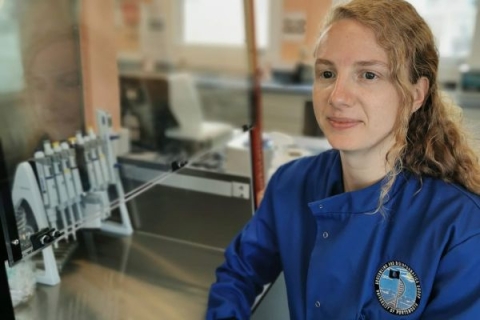

Angela Beckett was part of the COG-UK Consortium, which undertook UK-wide whole genome sequencing of the SARS-CoV-2 virus, the cause of COVID-19.
27 January 2023
4 minutes
Researchers from UK institutes, including the University of Portsmouth, have been recognised for their scientific excellence during the COVID-19 pandemic in a new book.
‘Snapshots of Women in COG: Scientific excellence during the COVID-19 pandemic’ has been published by the UK’s COVID-19 Genomics UK (COG-UK) Consortium.
The book tells personal stories from women involved in the COVID-19 pandemic and a celebration of their achievements. It also features stories from men who have played an active role in supporting and promoting women.
Angie Beckett and Dr Sam Robson from the University of Portsmouth, along with research colleagues Sharon Glaysher, Kelly Bicknell and Allyson Lloyd from Portsmouth Hospitals University NHS Trust, feature in the book.
Angie said: “During the pandemic, people from many different universities, NHS Trusts, and Public Health Agencies (most of whom had never met in person), volunteered their time and expertise to tackle COVID-19 together. It was really inspiring, and the cooperative nature of the work has had a lasting impact on me. I feel very lucky to have been part of such a network and to have made a positive contribution.”
The COG-UK Consortium undertook UK-wide whole genome sequencing of the SARS-CoV-2 virus, the cause of COVID-19, to identify variants of concern and aid our understanding of how the virus spread and evolved through the study of its genetic code.
It was really inspiring, and the cooperative nature of the work has had a lasting impact on me. I feel very lucky to have been part of such a network and to have made a positive contribution.
Angie Beckett, Specialist Research Technician, Centre for Enzyme Innovation
The researchers from the University’s Faculty of Science and Health, led by Dr Robson from the Centre for Enzyme Innovation (CEI), analysed the genetic code of thousands of viral samples from across the south of England.
These data were made publicly available and were used to track the virus locally, nationally and internationally as it spread and mutated. The data helped to inform Public Health responses and policies, as well as the development of potential treatments and vaccines.
On a local level, Dr Robson, Miss Beckett, and their team were able to provide information to Portsmouth Hospitals University NHS Trust on ongoing spread within the hospital, emergence of novel variants to the area, and potential introductions from the community that could be prevented through infection prevention and control.
Dr Robson said: “My team and I have been proud to be a part of the COG-UK Consortium, and use our expertise to have a positive impact on the pandemic. We worked with so many wonderful and talented people, and this book is an opportunity to see their contribution recognised and their personal stories told. I hope that this will help to inspire young women, like my daughter, towards becoming future STEM leaders.”
We worked with so many wonderful and talented people, and this book is an opportunity to see their contribution recognised and their personal stories told. I hope that this will help to inspire young women, like my daughter, towards becoming future STEM leaders.
Dr Sam Robson, Principal Research Fellow (Bioinformatics), Centre for Enzyme Innovation
Professor Sharon Peacock CBE, executive director and chair of COG-UK, added: “Women have been vital to the many successes of COG-UK, whether in sequencing laboratories, bioinformatic tool development, data analysis, public health, operations, communication, administration or leadership. However, the accomplishments of women within the consortium (and more generally, within global pandemic responses) have not always been as visible as those of male colleagues.
“Women have shown endless resourcefulness and tireless devotion to making a genuine difference in the world, whether in our daily duties or in working to create positive spaces for women to thrive. Collectively, the experiences and discussion shared in the book paint a positive picture of women who have developed careers, moved into positions of leadership and responsibility, and received a good deal of support, despite having to overcome some outdated attitudes and barriers along the way.”
Last year, a report by the not-for-profit institute RAND Europe found that Portsmouth researchers played an important role in the UK’s response to COVID-19. It found that COG-UK’s efforts to sequence and understand the diverse variants of SARS-CoV-2, have been key to informing public health decision-making and efforts to control its spread.
